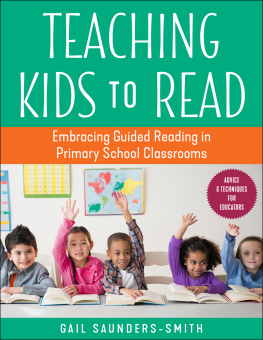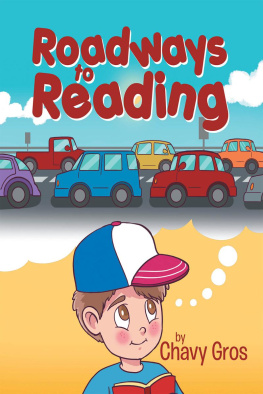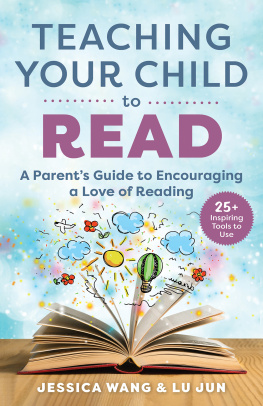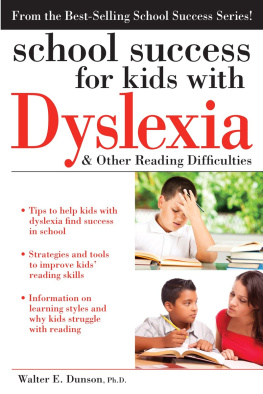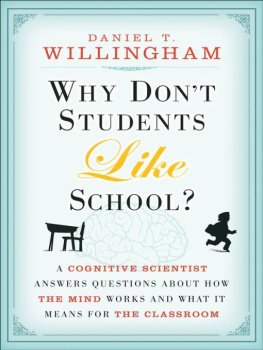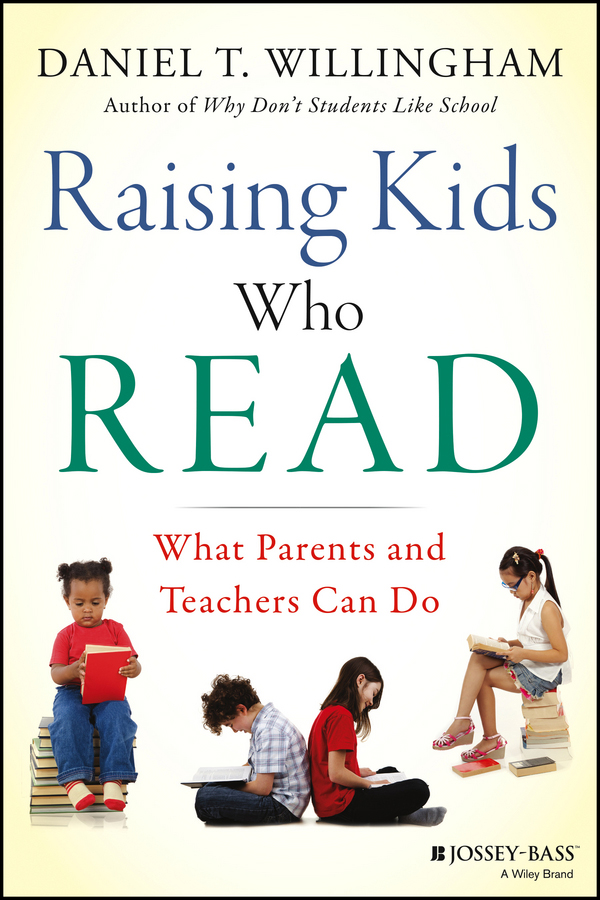
Contents
List of Illustrations
Pages
Guide
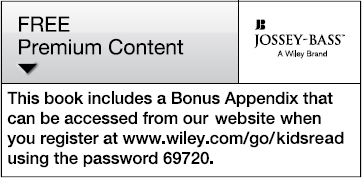
Raising Kids Who Read
What Parents and Teachers Can Do
Daniel T. Willingham
Cover design by Wiley
Baby reading Jose Manuel Gelpi diaz | Thinkstock
Kids reading Jacek Chabraszewski | Thinkstock
Girl reading Stuart Miles | Thinkstock
Copyright 2015 by Daniel T. Willingham. All rights reserved.
Published by Jossey-Bass
A Wiley Brand
One Montgomery Street, Suite 1200, San Francisco, CA 941044594www.josseybass.com/highereducation
No part of this publication may be reproduced, stored in a retrieval system, or transmitted in any form or by any means, electronic, mechanical, photocopying, recording, scanning, or otherwise, except as permitted under Section 107 or 108 of the 1976 United States Copyright Act, without either the prior written permission of the publisher, or authorization through payment of the appropriate per-copy fee to the Copyright Clearance Center, Inc., 222 Rosewood Drive, Danvers, MA 01923, 978-750-8400, fax 978-646-8600, or on the web at www.copyright.com. Requests to the publisher for permission should be addressed to the Permissions Department, John Wiley & Sons, Inc., 111 River Street, Hoboken, NJ 07030, 201-748-6011, fax 201-748-6008, or online at www.wiley.com/go/permissions.
Limit of Liability/Disclaimer of Warranty: While the publisher and author have used their best efforts in preparing this book, they make no representations or warranties with respect to the accuracy or completeness of the contents of this book and specifically disclaim any implied warranties of merchantability or fitness for a particular purpose. No warranty may be created or extended by sales representatives or written sales materials. The advice and strategies contained herein may not be suitable for your situation. You should consult with a professional where appropriate. Neither the publisher nor author shall be liable for any loss of profit or any other commercial damages, including but not limited to special, incidental, consequential, or other damages. Readers should be aware that Internet websites offered as citations and/or sources for further information may have changed or disappeared between the time this was written and when it is read.
Jossey-Bass books and products are available through most bookstores. To contact Jossey-Bass directly call our Customer Care Department within the U.S. at 800-956-7739, outside the U.S. at 317-572-3986, or fax 317-572-4002.
Wiley publishes in a variety of print and electronic formats and by print-on-demand. Some material included with standard print versions of this book may not be included in e-books or in print-on-demand. If this book refers to media such as a CD or DVD that is not included in the version you purchased, you may download this material at http://booksupport.wiley.com. For more information about Wiley products, visit www.wiley.com.
Library of Congress Cataloging-in-Publication Data
Library of Congress Cataloging-in-Publication Data has been applied for and is on file with the Library of Congress.
ISBN 978-1-118-76972-0 (cloth); ISBN 978-1-118-91150-1 (ebk.); ISBN 978-1-118-91158-7 (ebk.)
For Trisha
ABOUT THE AUTHOR
Daniel Willingham is professor of psychology at the University of Virginia, where he has taught since 1992. Until about 2000, his research focused solely on the brain basis of learning and memory. Today, all of his research concerns the application of cognitive psychology to K16 education. He writes the Ask the Cognitive Scientist column for American Educator magazine and is the author of Why Dont Students Like School? (Jossey-Bass, 2009) and When Can You Trust the Experts? (Jossey-Bass, 2012). His writing on education has appeared in thirteen languages. He earned his BA from Duke University and his PhD in cognitive psychology from Harvard University. His website is www.danielwillingham.com.
ACKNOWLEDGMENTS
I received useful feedback from Helen Alston, Karin Chenoweth, Tracy Gallagher, Fred Greenewalt, Lisa Guernsey, Michael Kamil, Margie McAneny, Mike McKenna, and Steve Straight. Special thanks to Lauren Goldberg, Kristen Turner, and Shannon Wendling and to seven anonymous reviewers, each of whom provided detailed comments on the entire manuscript. Gail Lovette generously offered consultation throughout this project. David Dobolyi did yeomans work on the survey reported in the Introduction, and Anne Carlyle Lindsay created many of the figures. My thanks, as ever, to Esmond Harmsworth for his unfailing support and sound advice, and to Margie McAneny, who took special care with this project. Most of all, I thank Trisha Thompson-Willingham, my parenting lodestar; her wisdom informs much of the approach outlined in this book.
Introduction
Have Fun, Start Now
Were going to start this book with a quick thought experiment. Suppose you have a teenaged child. (If you actually do, so much the better.) Surveys show that the typical teen has about five hours of leisure time each weekday. How would you like your teenager to spend those five hours? To provide a little structure, Ill give you six categories of activities among which the time could be allocated. (Note that with six categories, equal time to each activity is fifty minutes.)
| Relaxing/thinking | __ minutes |
| Playing video games/using a computer | __ minutes |
| Reading | __ minutes |
| Socializing | __ minutes |
| Watching television | __ minutes |
| Playing sports | __ minutes |
Have your answers? You can compare them to the results of a survey I conducted of three hundred American adults. Ive also depicted the actual number of minutes that teens spend on each activity, according to the national American Time Use Survey (). For reading, the hoped-for amount among my respondents was 75 minutes. The actual time American teenagers spend reading is 6 minutes.
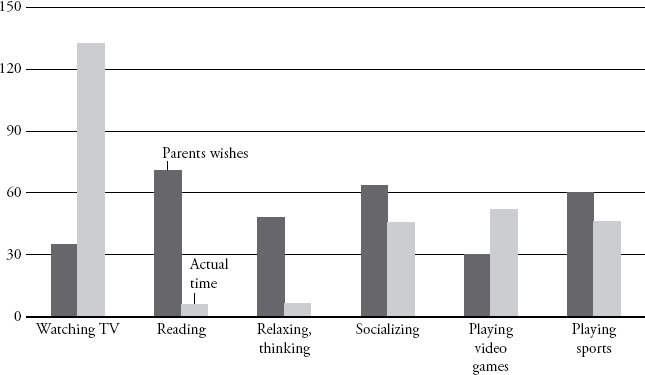
. Wishes versus reality in teenagers leisure time. Darker bars show how our survey respondents hoped teenagers would spend their leisure time. Lighter bars show actual leisure time spent, according to the American Time Use Survey.
Source: Daniel Willingham.
The purpose of this book is simple. Parents want kids to read. Most kids dont. What can parents do about that?
Of course, some kids do grow up as readers. The numbers in are a little deceptive because they are averages; its not that each teenager goes home from school, reads for six minutes, and then puts the book down. Most kids dont read at all, and a few read quite a lot. Can the parents of those readers provide us with any guidance?
In my experience, most of those parents have little idea of how their kids ended up as readers. A conversation I had with an editor at the New York Times is typical. I mentioned I was working on this book, and he told me that his eighth grader was the kind of kid who had to be reminded to step outside every now and then to get a little fresh air, so devoted was she to whatever book she was reading. When I asked what he and his wife had done to foster this passion, he laughed heartily and said, Not a damn thing.
Next page

